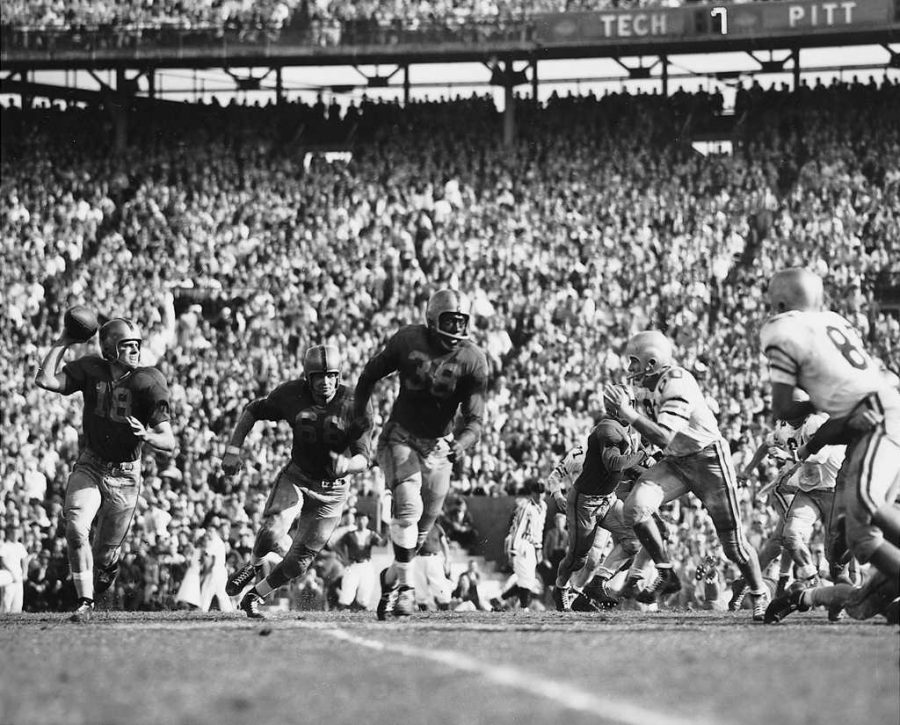In the face of racial adversity, a football team stood up for justice.
The players stood as one, risking missing a game in order to ensure a safe environment for all people.
This scenario casts the 2015 Missouri football team, where players ceased football activities until the school’s president, Tim Wolfe, resigned following a series of racially charged incidents on campus.
College football has seen this motif before, prior to the Tigers taking their bold and impactful stand. The University of Pittsburgh’s own football team also used their platform to promote racial equality during a period of unrest too similar to today’s dialogue.
The year was 1956. The game was the Sugar Bowl. The opponent was Georgia Tech. And because of the color of one player’s skin, the game was in jeopardy.
The matchup between the seventh-ranked Yellow Jackets and the 11th-ranked Panthers came at a major crossroads in United States race relations, just one month after Rosa Parks’ famed protest. The civil rights movement was about to explode.
One day after the protest, Marvin Griffin, the governor of Georgia, said via telegram statement that “The South stands at Armageddon,” asking schools in the Georgia state university system to not play in any sporting event where African-Americans were either on the field or in the stands.
The Panthers did have an African-American on their team — a fullback and linebacker named Bobby Grier. He would be the first black football player to appear in the esteemed Sugar Bowl in New Orleans, meaning he would be the first to play in a bowl game in the deep south.
With the game in limbo because of the demands of a segregationist politician, it would have been easy for Grier’s teammates — particularly at that time in American history — to remain silent, to shun Grier or to distance themselves from him to ensure their shot at bowl glory. Instead, they stood firm in their support, vowing, “No Grier, no game.”
Pitt refused to budge, and Georgia Tech’s team joined the Panthers’ side in the movement. Bobby Grier would play, and the Sugar Bowl would not segregate in the stands.
Pitt went on to lose the game 7-0, but they won the much more significant battle — the fight for social progress.
At a crucial time in our country’s civil rights history, college athletes took a stand. They used their platform. Pitt players knew that they were putting a critical game on the line, with little to gain personally in doing so.
Jump forward six decades, and the Missouri football team’s stand comes at a similar inflection point in the country’s social history. Racial tensions are high. Ferguson protests, “I Can’t Breathe” shirts and the Black Lives Matter movement have provided a chalkboard for the previously hushed black Americans who aren’t going to take it anymore.
Everything that happened at Missouri to ignite the protests — hurled racial slurs, swastikas made of feces — shouldn’t be happening anymore. And that’s the difference.
We have to realize that Wolfe’s resignation won’t exactly turn race relations right. Like Grier’s victory before them, this won’t end racism in the United States. It won’t end racism at Missouri. But it serves as a victory for standing on the right side of history and a victory for athletes speaking out.
Too often, athletes plead the Fifth, give “no comment” or don’t care about the issues. Perhaps all the sports world needed was a reminder about how loudly their voices can resonate.
On college campuses, their voices are even louder. They’re school celebrities. More students at a major conference school would probably recognize the university’s starting quarterback than its chancellor. As Mizzou proved, their actions carry weight, and they clearly make an impact.
The Missouri football team can’t be the last football team to use its platform to promote social change. Here’s hoping this is a catalyst and not an exception.


